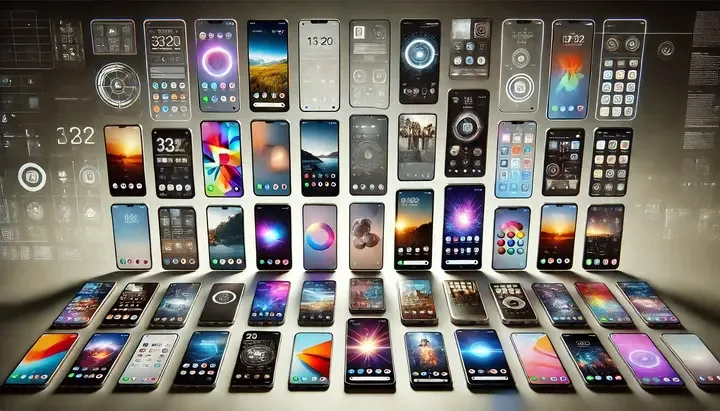
Smartphones of the Future: Trends and Forecasts for the Coming Years
Smartphones have become an integral part of our daily lives, revolutionizing communication, entertainment, and productivity. As technology continues to evolve at a rapid pace, the future of smartphones promises even more innovative features and capabilities. This article explores the main technological trends in the development of smartphones, predictions on hardware and software advancements, and the environmental and social implications of these ubiquitous devices.
The Main Technological Trends in the Development of Smartphones
One of the most significant trends in smartphone development is the push towards foldable and flexible screens. Companies like Samsung and Huawei have already introduced foldable smartphones, and the technology is expected to mature, offering more durable and versatile displays. Another trend is the integration of 5G technology, which will become the standard for high-speed mobile internet, enabling faster data transfer and more reliable connections.
Augmented Reality (AR) and Virtual Reality (VR) are also becoming more prominent in smartphone technology. With improved sensors and cameras, smartphones are now capable of delivering immersive AR and VR experiences. Additionally, advancements in artificial intelligence (AI) are leading to smarter and more intuitive user interfaces, enhancing the overall user experience.
Predictions on the Hardware Part of Smartphones
In the coming years, we can expect significant improvements in smartphone hardware. One of the key areas of development is battery technology. Researchers are working on new battery materials and designs that promise longer battery life and faster charging times. Solid-state batteries, which are safer and more efficient than current lithium-ion batteries, could become the norm.
Processor technology will also see major advancements. Future smartphones will feature more powerful and energy-efficient processors, capable of handling complex tasks and supporting advanced AI functionalities. Additionally, the trend towards miniaturization will continue, with components becoming smaller and more integrated, allowing for thinner and lighter devices.
Camera technology is another area where we can expect remarkable improvements. Multi-lens setups will become more common, offering better image quality, improved low-light performance, and enhanced zoom capabilities. Computational photography, which uses AI to enhance images, will also play a significant role in future smartphones.
New Software Features and Capabilities
The software capabilities of smartphones are set to expand dramatically. One of the most anticipated developments is the integration of more advanced AI and machine learning algorithms. These technologies will enable smartphones to offer personalized experiences, from customized app suggestions to intelligent virtual assistants that can understand and predict user needs.
Security and privacy features will also see significant enhancements. Biometric authentication methods, such as facial recognition and fingerprint scanning, will become more sophisticated and secure. Moreover, new software will provide better protection against malware and cyber threats, ensuring that user data remains safe.
Another exciting development is the potential for seamless integration with other smart devices. Future smartphones will act as central hubs for controlling and interacting with a wide range of smart home devices, wearables, and IoT (Internet of Things) gadgets. This interconnected ecosystem will provide users with unprecedented convenience and control over their digital environments.

Environmental and Social Aspects of Smartphones
As the demand for smartphones continues to grow, so does the need for sustainable and environmentally friendly practices in their production and disposal. Companies are increasingly focusing on using recycled and biodegradable materials in their devices. Moreover, efforts are being made to reduce the carbon footprint of manufacturing processes and to develop more energy-efficient components.
Socially, smartphones are playing a crucial role in bridging the digital divide. By providing affordable access to information and communication technologies, smartphones are empowering people in developing regions and contributing to economic growth. However, there are also concerns about e-waste and the ethical implications of sourcing materials. Addressing these issues will be essential for creating a more sustainable future for smartphones.
Looking to the Future: How Smartphones Will Change Our Lives
The evolution of smartphones will continue to shape our lives in profound ways. With advancements in AI and machine learning, smartphones will become even more integral to our daily routines, assisting us in ways we can hardly imagine today. From healthcare and education to entertainment and work, smartphones will enhance our capabilities and improve our quality of life.
In the near future, we can expect smartphones to become even more personalized and adaptive, seamlessly integrating with our environments and lifestyles. They will not only be tools for communication but also essential companions that understand and anticipate our needs. As we look forward to these exciting developments, it is crucial to consider the environmental and social impacts, ensuring that the future of smartphones is both innovative and sustainable.
Popular topics
-
 Choosing the Right VPN App for Your Smartphone: A Complet...
Choosing the Right VPN App for Your Smartphone: A Complet...Selecting the best VPN app for your smartphone can be …
-
 Integrating Unreal Engine into Casino Game Development: A...
Integrating Unreal Engine into Casino Game Development: A...The gaming industry stands on the brink of a revolution, …
-
 Low-Code and No-Code: How a New Generation of Software Re...
Low-Code and No-Code: How a New Generation of Software Re...The rapid maturation of low-code and no-code tools has transformed …
-
 Cloud Storage Deletion: What Really Happens to Your Files...
Cloud Storage Deletion: What Really Happens to Your Files...Deleting a file in cloud storage is usually a two-step …
-
 Microkernels in Smartphones: The Future of Mobile Securit...
Microkernels in Smartphones: The Future of Mobile Securit...In recent years, discussions around microkernel-based operating systems have gained …
